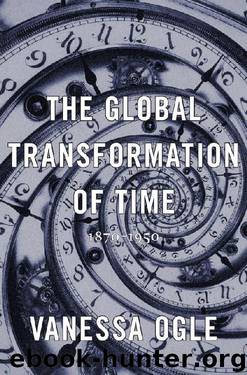The Global Transformation of Time by Vanessa Ogle

Author:Vanessa Ogle [Ogle, Vanessa]
Language: eng
Format: epub
ISBN: 9780674286146
Publisher: Harvard University Press
Published: 2015-10-11T21:00:00+00:00
THE RELATIONSHIP between individual exertions to improve one’s fate and collective gain was perhaps expressed most clearly in a piece that appeared in Butrus al-Bustani’s journal al-Jinan. The essay’s author, Salim Diyab, started his piece by describing how ancient societies held different views on the prediction of fate and how to define certain times of luck or misfortune, without distinguishing between different aspects of time such as fate and life. The ancients failed to see the movements of time and fate as the ultimate source of self-engineered social mobility but rather, it was implied, believed in the almighty power of fate against which the individual stood powerless.74 Diyab rejected such ideas as superstitious rumors. But he did acknowledge that a concern for the future, a proactive way of “encountering time,” as Diyab put it, was mandatory for everybody who strove to succeed in life. Such an activist encounter with time emanated from “good planning and training” and devoting oneself to “what will happen before it happens.”75 If man made an intellectual effort, it was possible for him to limit his thoughts to earnestness, perseverance, hope, economizing and dividing up time, and studying local and international events, Diyab stated. Whoever observed such caveats and spent his time in useful ways was able to stop in front of his fate with a sturdy soul, not fearing its feckless turmoil.76
In a move characteristic of nahḍawi authors, Diyab then turned to history to corroborate his arguments. History and historical time were a popular and frequent subject of articles and other publications, interpreted to serve the purpose of the Nahḍa. Authors like Jurji Zaydan in his journal al-Hilal as well as several anonymous or less well-known writers talked extensively about different golden ages in Islamic history and the evolution of civilizations. Articles about history, historical ages, and how to launch a renewed golden age for the Arab and Islamic civilization were another expression of a general interest in time: in this case, historical time. The heightened interest in the nature and use of time and the development of a genre of history writing through an inquiry into the histories of the region were two sides of the same coin. History and the development of civilizations were linked to the progression of linear time in very literal ways. Arab intellectuals wielded the terms “progress” (taqaddum) and “backwardness” (taʾakhkhur) when comparing historical developments of “successful” and “laggard” civilizations. All Arab periodicals of the period carried countless articles expanding on these notions. When writers described the act of setting a clock or watch back or forward (as “Arabic time” necessitated on a daily basis), or adjusting a clock that was running slow or fast, the words for “back” and “forward,” “slow” and “fast,” were variations of the Arabic words for progress and backwardness.77
According to Salim Diyab, author of the piece in al-Jinan, the history of “civilized” nations provided a lesson for “encountering time,” as the headline of his essay ran. When looking at the “civilized world” and the
Download
This site does not store any files on its server. We only index and link to content provided by other sites. Please contact the content providers to delete copyright contents if any and email us, we'll remove relevant links or contents immediately.
| Electron Microscopes & Microscopy | Experiments & Projects |
| Measurement | Microscopes & Microsocopy |
| Scientific Instruments | Telescopes |
| Time | Methodology & Statistics |
Hands-On Genetic Algorithms with Python by Eyal Wirsansky (2020) by Unknown(4105)
Thing Explainer by Randall Munroe(3930)
The Elements by Theodore Gray(3050)
The Meaning of it All by Richard Feynman(2347)
Make by Mike Westerfield(2317)
Every Tool's a Hammer by Adam Savage(1934)
Science Experiments You Can Eat by Vicki Cobb(1875)
The Perfectionists by Sara Shepard(1819)
Martin Gardner's Science Magic by Martin Gardner(1727)
Raspberry Pi Electronics Projects for the Evil Genius (Tab) by Norris Donald & Norris Donald(1703)
Elephants on Acid by Boese Alex(1599)
Elephants on Acid: And Other Bizarre Experiments by Alex Boese(1586)
The Perfectionists by Simon Winchester(1581)
Handbook of Modern Sensors by Jacob Fraden(1568)
Synchrotron Light Sources and Free-Electron Lasers by Eberhard J. Jaeschke Shaukat Khan Jochen R. Schneider & Jerome B. Hastings(1551)
Tesla by Carlson W. Bernard(1521)
The Science of Food by Marty Jopson(1467)
125 Physics Projects for the Evil Genius by Silver Jerry(1449)
The Meaning Of It All by Richard P. Feynman(1441)
